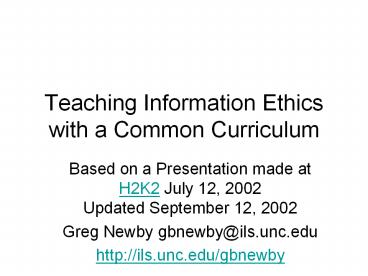Teaching Information Ethics with a Common Curriculum - PowerPoint PPT Presentation
Title:
Teaching Information Ethics with a Common Curriculum
Description:
... major in information science) at the college level, also many new courses. Curriculum? ... this in about the 5th grade, 10th grade and 1st year of college ... – PowerPoint PPT presentation
Number of Views:107
Avg rating:3.0/5.0
Title: Teaching Information Ethics with a Common Curriculum
1
Teaching Information Ethics with a Common
Curriculum
- Based on a Presentation made at H2K2 July 12,
2002Updated September 12, 2002 - Greg Newby gbnewby_at_ils.unc.edu
- http//ils.unc.edu/gbnewby
2
Overview of the Session
- Who is this guy?
- Why develop some sort of curriculum?
- Who is the curriculum for?
- Goals
- Implementation plan
- Feedback?
3
Greg Newby
- Has taught about the Internet and predecessor
networks since 1988 - Writes code, does research on open source search
engines - Has given talks on hacker ethics and related
topics at H2K and HAL 2001. - Has developed new curricula (including an
undergraduate major in information science) at
the college level, also many new courses.
4
Curriculum? Whats that? Why?
- A curriculum (plural curricula) is a course of
study. In practice, its a set of courses or
other instructional units (like a series of
workshops) - Curricula exist for nearly all academic and
non-academic structured learning. For example,
to get a college degree you need to follow the
guidelines in the curriculum for that degree. - K-12 schools have set curricula to enable
standard quality expectations and exit
requirements
5
Why a Curriculum for Information Ethics?
- Schools at all levels (especially high school and
college) are requiring computer competency - Very few include components of appropriate use
especially ethics of computer-based tools - Lets fix that, by including training for
information ethics in curricula at different
levels early education, high school and college
6
What are some suggested values for info ethics
curriculum?
- Theme value of information
- Information has value
- There are value-adding processes, such as
organization, summarization, extraction - Theme Information privacy
- People should have some expectation of privacy,
but also some expectation of non-privacy. When? - Others may invade on your privacy. What can you
do?
7
More themes
- Theme Information security
- You can take steps to determine how information
you generate, or about you, is utilized - You can take steps to add value to information by
data integrity, safeguarding, verifying, etc. - Theme Secrecy
- What is secrecy? When is secrecy effective?
8
The Suggested Curriculum
- Add a few hours of instruction with contextual
localized examples on information ethics to
computer training - gbns suggestion is to do this in about the 5th
grade, 10th grade and 1st year of college - gbn is developing curriculum details to try to
work with CPSR on making the curriculum happen in
NC and elsewhere
9
Sample Teaching UnitElementary School
- For grade school (during the first structured
introduction to computing, especially networked
computing) - What is information about me, and who knows it?
- Why do we keep secrets sometimes?
- What kinds of things can I find out using
computers? Is what I find on a computer always
right?
10
Sample Teaching Unit High School
- What data about me exist, and what sort of
privacy do I have? - Why is some information secret and other
information public? What secrets can a
computer tell me? - Find and discuss examples of erroneous
information on the Internet - What are some differences between effective and
ineffective use of information tools? How can
the value of information be changed?
11
Ssample Teaching Unit College
- What is data integrity? How is it related to the
value of data? - Is information a commodity? Why or why not?
- How can you evaluate an information sources
credibility? Information timeliness? What other
factors impact information value?
12
Curriculum Delivery
- Get people to talk about their experiences
- Emphasize concepts, not skills
- The issues of information ethics are not strictly
computer-related, but computers are the major
method for storing and accessing information so
play a strong role - Information ethics could be taught in far greater
depth and at different times, these ideas are
meant to be a minimal coverage suitable for easy
implementation by educators.
13
Desired Outcomes
- People who are better informed about information
ethics and related issues. - People who have thought about the concepts behind
computer-based tools, not just the applications
and processes. - People stimulated to express and explore
curiosity about computer systems and the people
and institutions behind them. - People who question the status quo in systems
approaches to data security and info use
14
Whats Next?
- Feedback on these ideas, better structure and
planning for curricula - Actual creation of course modules or teaching
packets, with desired outcomes or measures - Making the modules available to interested
teachers and assessing impact - Creation and passage of curriculum standards































